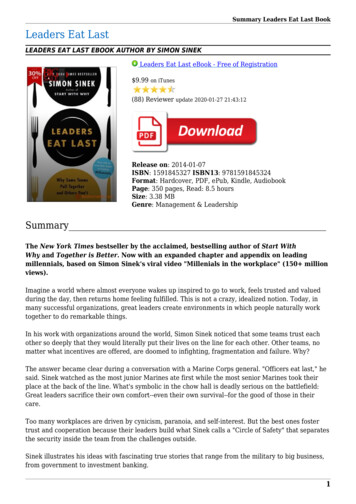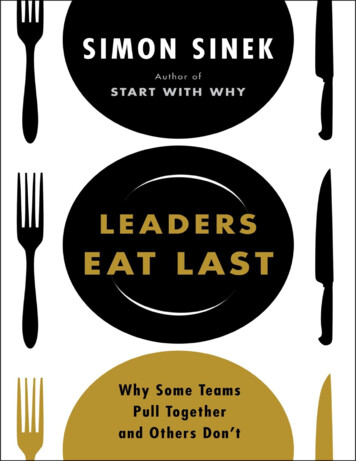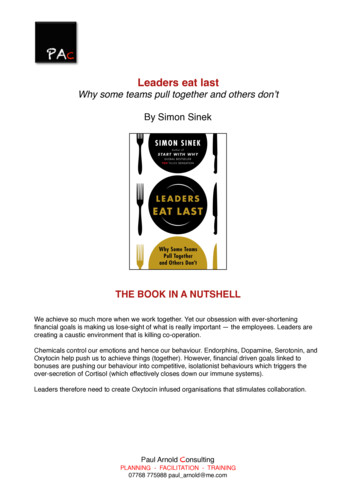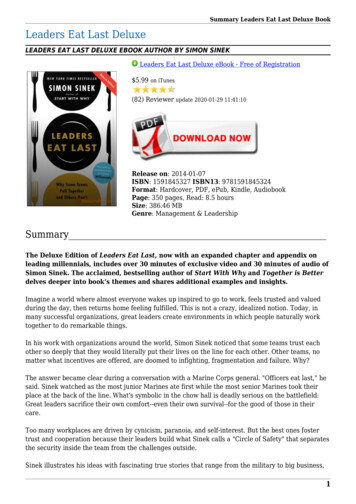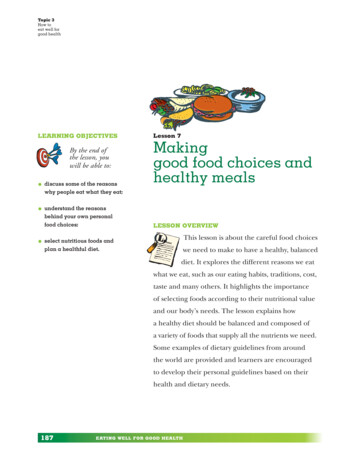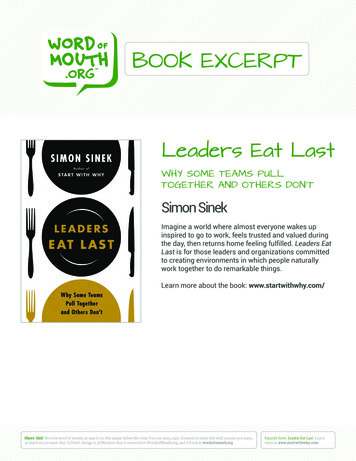
Transcription
BOOK EXCERPTLeaders Eat LastWHY SOME TEAMS PULLTOGETHER AND OTHERS DON’TSimon SinekImagine a world where almost everyone wakes upinspired to go to work, feels trusted and valued duringthe day, then returns home feeling fulfilled. Leaders EatLast is for those leaders and organizations committedto creating environments in which people naturallywork together to do remarkable things.Learn more about the book: www.startwithwhy.com/Share this! We love word of mouth, so pass it on. But please follow the rules. You can post, copy, forward, or share this with anyone you want,as much as you want. But: 1) Don’t change it, 2) Mention that it comes from WordofMouth.org, and 3) Link to wordofmouth.orgExcerpt from Leaders Eat Last. Learnmore at www.startwithwhy.com
ForewordIknow of no c ase study i n h istory t hat describes a n organization t hat hasbeen managed out of a crisis. Every single one of them was led. Yet a goodnumber of our educational institutions and training programs today are focused n ot o n d eveloping g reat l eaders b ut o n t raining e ffective m anagers.Short-term gains are viewed as the mark of success and long-term organizational growth and viability are simply the bill payers. Leaders Eat Last is aneffort to change this paradigm.In Leaders E at L ast, Simon S inek d oes n ot propose a ny n ew l eadershiptheory or core principle. He has a much higher purpose to his writing. Simonwould like to make the world a better place for all of us. His vision is simple:to create a new generation of men and women who understand that an organization’s success or failure is based on leadership excellence and not managerial acumen.It is not an accident that Simon uses the U.S. military, and in particularthe United States Marine Corps, to explain the importance of leaders beingfocused on their people. ἀ ese organizations have strong cultures and sharedvalues, u nderstand t he i mportance o f t eamwork, c reate t rust a mong t heirmembers, maintain focus, and, most important, understand the importanceof people and relationships to their mission success. ἀ ese organizations arealso in a position where the cost of failure can be catastrophic. Mission failure is not a n option. Without a d oubt, people enable t he success of a ll ourmilitary services.When you are with Marines gathering to eat, you will notice that the mostjunior are served first and the most senior are served last. When you witnessthis act, you will also note that no order is given. Marines just do it. At theheart of this very simple action is the Marine Corps’ approach to leadership.xi7504 Leaders Eat Last CS5.5ejs [FIN].indd 1111/7/13 12:40 PM
xiiforewordMarine leaders are expected to eat last because the true price of leadership isthe w illingness to place t he needs of others above your own. Great leaderstruly c are a bout t hose t hey a re privileged t o lead a nd u nderstand t hat t hetrue cost of the leadership privilege comes at the expense of self-interest.In his previous book, Start with Why: How Great Leaders Inspire Everyoneto Take Action, Simon explained that for an organization to be successful itsleaders need to understand the true purpose of their organization—the Why.In Leaders Eat Last, Simon takes us to the next level of understanding whysome organizations do better than others. He does this by detailing all elements of t he leadership c hallenge. Simply s tated, it i s not enough to k now“the Why” of your organization; you must know your people and realize thatthey a re m uch m ore t han a n e xpendable r esource. I n s hort, p rofessionalcompetence is not enough to be a good leader; good leaders must truly careabout those entrusted to their care.Good management is clearly not enough to sustain any organization overthe long term. Simon’s i n-depth explanation of t he elements of human behavior clearly demonstrates that there are real reasons why some organizations may do well over a short period of time but eventually fail: ἀ e leadershiphas failed to create an environment where people really do matter. As Simonpoints out, organizations where people share values and are valued succeedover the long term in both good and bad times.John Quincy Adams would have understood Simon’s message because heclearly understood what it was to be a leader when he stated: “If your actionsinspire others to dream more, learn more, do more and become more, youare a leader.” In this quote, I think you will find the message of Leaders EatLast. When leaders inspire those they lead, people dream of a better future,invest time and effort in learning more, do more for their organizations andalong the way become leaders themselves. A leader who takes care of theirpeople a nd s tays focused on t he well-being of t he organization c an n everfail. My hope is t hat after reading t his book readers w ill be inspired to a lways eat last.George J. Flynn,Lieutenant General, U.S. Marine Corps (Ret.)7504 Leaders Eat Last CS5.5ejs [FIN].indd 1211/7/13 12:40 PM
TheForce7504 Leaders Eat Last CS5.5ejs [FIN].indd 111/7/13 12:40 PM
Pa r t1[ Our Need to Feel Safe ]Chapter 1Protection from AboveAthick l ayer o f c louds b locked out a ny l ight. ἀ ere were n o s tars a ndthere was no moon. Just black. ἀ e team slowly made its way throughthe valley, the rocky terrain making it i mpossible to go a ny faster than asnail’s pace. Worse, they knew they were being watched. Every one of themwas on edge.A year hadn’t yet passed since t he attacks of September 11. ἀ e Talibangovernment had only recently fallen after taking a pounding from U.S. forcesfor their refusal to turn over the Al Qaeda leader, Osama bin Laden. ἀ erewere a lot of Special Operations Forces in the area performing missions that,to this day, are still classified. ἀ is was one of those teams and this was one ofthose missions.All we know is that the team of twenty-two men was operating deep insideenemy t erritory a nd h ad r ecently c aptured w hat t he g overnment c alls a“high-value target.” ἀ ey were now working their way through a deep valleyin a mountainous part of Afghanistan, escorting their high-value target to asafe house.Flying o ver t he t hick c louds t hat n ight w as C aptain M ike D rowley, o rJohnny Bravo, a s he is k nown by h is c all sign or nickname. E xcept for t hewhir of his engines, it was perfectly p eaceful up there. ἀ ousands of starsspeckled the sky, and the moon lit up the top of the clouds so brightly itlooked like a fresh layer of snow had fallen. It was beautiful.37504 Leaders Eat Last CS5.5ejs [FIN].indd 311/7/13 12:40 PM
4l e a d e r s e at l a s tJohnny Bravo and his wingman were circling above in their A-10 aircraft,waiting should they be needed below. Affectionately known as the Warthog,the A -10 i s n ot t echnically a fighter j et; i t’s a n a ttack a ircraft. A r elativelyslow-flying, single-seat armored plane designed to provide close air supportfor troops on the ground. Unlike other fighter jets, it is not fast or sexy (hencethe nickname), but it gets the job done.Ideally, both the A-10 pilots in the air and the troops on the ground wouldprefer t o s ee e ach o ther w ith t heir e yes. S eeing t he p lane a bove, k nowingsomeone is looking out for t hem, g ives t he troops below a g reater sense ofconfidence. And seeing the troops below gives the pilots a greater sense ofassurance that they will be able to help if needed. But given the thick cloudcover and the mountainous terrain that night in Afghanistan, the only wayeither k new t he o ther w as t here w as t hrough t he o ccasional r adio c ontactthey kept. Without a line of sight, Johnny Bravo couldn’t see what the troopssaw, but he could sense how the troops felt from what he heard over the radio.And this was enough to spur him to act.Following his gut, Johnny Bravo decided he needed to execute a weatherletdown, to drop down below the clouds so he could take a look at what washappening on the ground. It was a daring move. With the thick, low-hangingclouds, s cattered s torms i n t he a rea a nd t he f act t hat Johnny Bravo wouldhave to fly into a v alley w ith his field of v ision reduced by t he night-visiongoggles, performing the weather letdown under these conditions was extremelytreacherous for even the most experienced of pilots.Johnny Bravo was not told to perform the risky maneuver. If anything, heprobably would have been told to hang tight and wait until he got the call tohelp. But Johnny Bravo is not like most pilots. Even though he was thousandsof feet above in the safe cocoon of his cockpit, he could sense the anxiety ofthe m en b elow. Re gardless o f t he d angers, h e k new t hat p erforming t heweather letdown was the right thing to do. And for Johnny Bravo, that meantthere was no other choice.ἀ en, just as he was preparing to head down t hrough t he clouds into t hevalley, his instincts were confirmed. ἀ ree words came across the radio. ἀ reelittle words that can send shivers down a pilot’s neck: “Troops in contact.”“Troops in contact” means someone on the ground is in trouble. It is thecall that ground forces use to let others know they are under attack. ἀ oughJohnny Bravo had heard those words many times before during training, itwas on this night, August 16, 2002, that he heard the words “troops in contact” for the first time in a combat situation.7504 Leaders Eat Last CS5.5ejs [FIN].indd 411/7/13 12:40 PM
PROTE C TION F ROM ABOVE5Johnny Bravo had developed a w ay to help him relate to the men on theground. To feel what they feel. During every training exercise, while flyingabove the battlefield, he would always replay in his mind the scene from themovie Saving P rivate R yan w hen t he A llies s tormed t he b eaches o f N ormandy. He would picture the ramp of a Higgins boat dropping down, themen running onto the beach into a wall of German gunfire. ἀ e bullets whizzing past t hem. ἀ e pings of stray shots hitting t he steel hulls of t he boats.ἀ e cries of men hit. Johnny Bravo had trained himself to imagine that thatwas the scene playing out below every time he heard “Troops in contact.”With t hose images v ividly embossed in his mind, Johnny Bravo reacted tothe call for assistance.He told his wingman to hang tight above the clouds, announced his intentions to the flight controllers and the troops below and pointed his aircraftdown i nto t he d arkness. A s h e p assed t hrough t he c louds, t he t urbulencethrashed him and his aircraft about. A hard push to the left. A sudden drop.A jolt to the right. Unlike the commercial jets in which we fly, the A-10 is notdesigned for passenger comfort, and his plane bounced and shook hard as hepassed through the layer of cloud.Flying into the unknown with no idea what to expect, Johnny Bravo focused his attention on his instruments, trying to take in as much informationas he could. His eyes moved f rom one d ial to t he next followed by a q uickglance o ut t he f ront w indow. A ltitude, s peed, h eading, w indow. A ltitude,speed, heading, window. “Please. Let. ἀ is. Work. Please. Let. ἀ is. Work,” hesaid to himself under his breath.When he finally broke t hrough t he clouds, he was less t han a t housandfeet off the ground, flying in a valley. ἀ e sight that greeted him was nothinglike he had ever seen before, not in training or in the movies. ἀ ere was enemy fire coming from both sides of the valley. Massive amounts of it. ἀ erewas so much that the tracer fire—the streaks of light that follow the bullets—lit up the whole area. Bullets and rockets all aimed at the middle, all aimedsquarely at the Special Operations Forces pinned down below.In 2002 the avionics in the aircraft were not as sophisticated as they aretoday. ἀ e instruments Johnny Bravo had couldn’t prevent him from hittingthe mountain walls. Worse, he was flying with old Soviet maps left over fromthe invasion of Afghanistan in the 1980s. But there was no way he was goingto let down those troops. “ἀ ere are fates worse than death,” he will tell you.“One fate worse than death is accidentally killing your own men. Anotherfate worse than death is going home alive when twenty-two others don’t.”7504 Leaders Eat Last CS5.5ejs [FIN].indd 511/7/13 12:40 PM
6l e a d e r s e at l a s tAnd so, on t hat d ark n ight i n August, Johnny Bravo started counting.He knew his speed and he knew his distance from the mountains. He didsome quick calculations in his head a nd counted out loud t he seconds hehad before he would hit the valley walls. “One one thousand, two one thousand, three one thousand . . .” He locked his guns onto a position fromwhich he could see a lot of enemy fire originating and held down the triggerof his Gatling g un. “Four one t housand, five one t housand, six one t housand . . .” At the point he ran out of room, he pulled back on the stick andpulled a s harp t urn. H is p lane r oared a s h e p ulled b ack i nto t he c loudabove, h is o nly o ption t o a void s macking i nto t he m ountain. H is b odypressed hard into his seat from the pressure of the G-forces as he set to goaround again.But there was no sound on the radio. ἀ e silence was deafening. Did theradio silence mean his shots were useless? Did it mean the guy on the radiowas down? Or worse, did it mean the whole team was down?ἀ en the call came. “Good hits! Good hits! Keep it coming!” And keep itcoming h e d id. H e t ook a nother p ass, c ounting a gain t o a void h itting t hemountains. “One one thousand, two one thousand, three one thousand . . .”And another sharp turn and another run. And another. And another. He wasmaking good hits and he had plenty of fuel; the problem now was, he was outof ammo.He pointed his plane up to the clouds to fly and meet his wingman, who wasstill circling above. Johnny Bravo quickly briefed his partner on the situationand told him to do one t hing, “Follow me.” ἀ e t wo A-10s, flying three feetapart from each other, wing to wing, disappeared together into the clouds.When they popped out, both less than a thousand feet above the ground,they began their runs together. Johnny Bravo did the counting and his wingman followed his lead and laid down the fire. “One one thousand. Two onethousand. ἀ ree o ne t housand. F our o ne t housand . . .” O n c ue, t he t woplanes pulled high-G turns together and went around again and again andagain. “One one thousand. Two one thousand. ἀ ree one thousand. Four onethousand.”ἀ at night, twenty-two men went home alive. ἀ ere were no Americancasualties.7504 Leaders Eat Last CS5.5ejs [FIN].indd 611/7/13 12:40 PM
PROTE C TION F ROM ABOVE7The Value of Empathyover Afghanistan, Johnny Bravo risked his life so thatothers m ight su rvive. H e r eceived n o p erformance b onus. H e d idn’t g et apromotion or a n award at t he c ompany off-site. He w asn’t looking for a nyundue attention or reality TV show for his efforts. For Johnny Bravo, it wasjust part of the “J.O.B.” as he puts it. And the greatest reward he received forhis service was meeting the forces for whom he provided top cover that night.ἀ ough they had never met before, when they finally did meet, they huggedlike old friends.In the linear hierarchies in which we work, we want the folks at the top tosee what we did. We raise our hands for recognition and reward. For most ofus, the more recognition we get for our efforts from those in charge, the moresuccessful we think we are. It is a system that works so long as that one personwho supervises u s s tays at t he c ompany a nd feels no u ndue pressure f romabove—a n early i mpossible s tandard t o m aintain. F or J ohnny B ravo a ndthose like him, the will to succeed and the desire to do things that advancethe i nterests of t he organization a ren’t just motivated by recognition f romabove; they are integral to a culture of sacrifice and service, in which protection comes from all levels of the organization.ἀ ere is one thing that Johnny Bravo credits for giving him the courageto cross into the darkness of the unknown, sometimes with the knowledgethat he might not come back. A nd it’s not necessarily what you would expect. As valuable as it was, it isn’t his training. And for all the advancedschooling he has received, it isn’t his education. A nd as remarkable as t hetools are that he has been given, it isn’t his aircraft or any of its sophisticatedsystems. F or a ll t he t echnology h e h as a t h is d isposal, e mpathy, J ohnnyBravo says, is t he single greatest asset he has to do his job. Ask a ny of t heremarkable men and women in uniform who risk themselves for the benefitof others why they do it and they will tell you the same thing: “Because theywould have done it for me.”Where do people like Johnny Bravo come from? Are they just born thatway? Some perhaps are. But if the conditions in which we work meet a particular standard, every single one of us is capable of the courage and sacrifice of a Johnny Bravo. ἀ ough we may not be asked to risk our lives or tosave a nybody e lse’s, we would g ladly s hare our g lory a nd help t hose w ithwhom we work succeed. More important, in the right conditions, the peopleTh a t A u g u s t n i gh t7504 Leaders Eat Last CS5.5ejs [FIN].indd 711/7/13 12:40 PM
8l e a d e r s e at l a s twith whom we work would choose to do those things for us. And when thathappens, when those kinds of bonds are formed, a strong foundation is laidfor t he k ind of success a nd f ulfillment t hat no a mount of money, fame orawards can buy. ἀ is is what it means to work in a place in which the leadersprioritize t he w ell-being o f t heir p eople a nd, i n r eturn, t heir p eople g iveeverything they’ve got to protect and advance the well-being of one anotherand the organization.I use the military to illustrate the example because the lessons are so muchmore exaggerated when it is a matter of life and death. ἀ ere is a pattern thatexists i n t he o rganizations t hat a chieve t he g reatest su ccess, t he o nes t hatoutmaneuver and outinnovate their competitors, the ones that command thegreatest respect f rom i nside a nd outside t heir organizations, t he ones w iththe highest loyalty and lowest churn and the ability to weather nearly everystorm o r c hallenge. ἀ ese e xceptional o rganizations a ll h ave c ultures i nwhich t he leaders provide cover f rom above a nd t he people on t he g roundlook out for each other. ἀ is is the reason they are willing to push hard andtake t he k inds of r isks t hey do. A nd t he way a ny organization can achievethis is with empathy.7504 Leaders Eat Last CS5.5ejs [FIN].indd 811/7/13 12:40 PM
7504 Leaders Eat Last CS5.5ejs [FIN].indd 11 11/7/13 12:40 PM. xii F oreword Marine leaders are expected to eat last because the true price of leadership is the willingness to place the needs of others above your own. Great leaders truly care about those they are privileged to lead and understand that the
